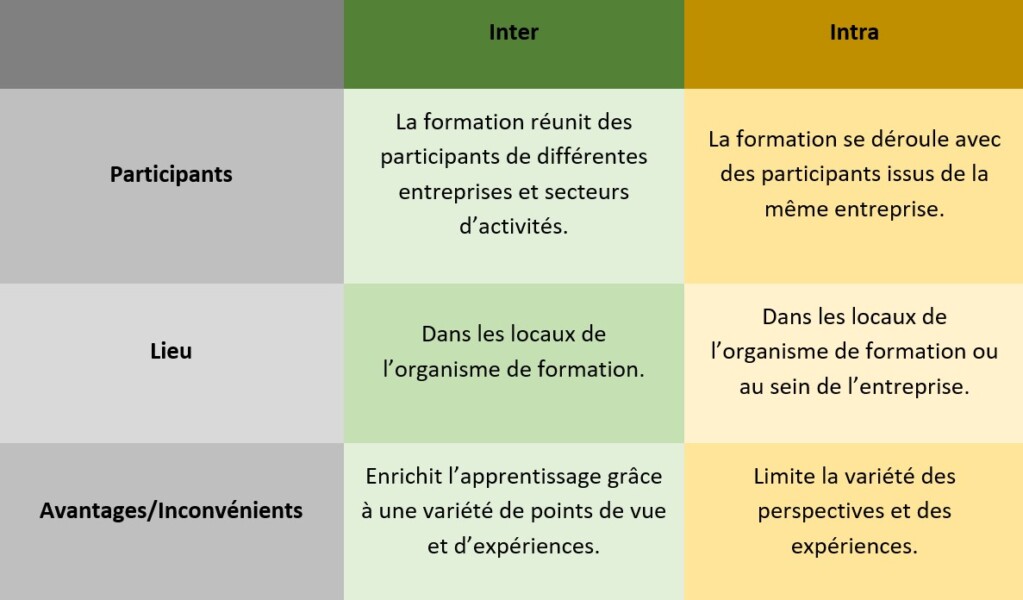Inter-company training has many benefits for both participants and their organisations. However, they are often little-known. This is due to the rich and varied terminology used to describe all the different training methods! So what exactly is business-to-business training? And how does it meet the needs of employees, training managers and, ultimately, companies?

Inter-company training has many advantages, whether for the participants, the training manager or the company. But participants and training decision-makers are not very familiar with the way in which continuing training is organised. This is one of the findings of a OpinionWay survey for ORSYS. Inter-company or intra-company training, distance learning or e-learning... what exactly are we talking about? In this article, ORSYS takes a look at the 'inter-company' format. On the menu: definition and main advantages, backed up by concrete examples and insights from Sandrine Bertrand, ORSYS trainera specialist in communication, personal development and management.
Inter-company training: definition
When drawing up a skills development plan, the training manager can choose from a wide range of training methods. The choice depends on the company's specific needs, its training strategy and the skills it wishes to develop in its employees. Among the options: inter-company training provided by a continuing education organisation, often abbreviated to "inter", which can be defined as opposed to intra-company or "intra" training.

Inter-company training: many benefits for participants
Inter-company training offers a wide range of benefits for employees undergoing training.
Learning enriched by the diversity of participants
The diversity of participants is one of the most significant advantages of inter-company training. In "in-house" training, participants come from the same company, which limits the variety of perspectives and experiences. On the other hand, in inter-company training, participants come from different companies, organisations and industries. enriches learning through a variety of viewpoints and experiences.
This gives rise to a collaborative learning between professionals from different backgrounds. They can combine their knowledge and experience specific to their company to achieve collective problem-solving. A group learning dynamics which can be difficult to reproduce in in-company training, where participants share the same professional context.
From networking to new business opportunities
This diversity of participants also offers opportunities to professional networking. Your employees have the opportunity to establish professional contacts with people working in other companies. This wider network can help them in their day-to-day work: poaching talent from another company, forging new partnerships or benefiting from expert advice. This is often the answer to needs of employees working in SMEs.
"It often happens that participants exchange contact details and references at the end of an inter-company training course. The wealth of information they share during the session makes them want to extend the experience later on.
Sandrine Bertrand, ORSYS trainer
Diversity for adaptability
The "inter" format also gives employees exposure to different corporate cultures. This provides additional opportunities to understand how other organisations approach challenges and opportunities. And it can also be invaluable for their personal development: adopting a broader perspective and adapting more easily to new situations.
Please note:
Some employees particularly appreciate get out of the company context and premises.
Change routine for a few days maybe stimulating creativity and innovation.
Follow the training out of sight of their colleaguesThese courses, particularly those dealing with personal development (stress management, assertiveness, etc.), can help them to :
- let loose ;
- allow yourself to get out of the box ;
- let yourself be right to make a mistake...
... for better learning!
Tangible benefits for the company and the training manager
For a training manager, and for the company as a whole, inter-company training also offers a number of very practical advantages.
Firstly, in terms of budget. By bringing together participants from different companies, the costs of training, logistics and resources are shared, making training more affordable.
This is very advantageous for small and medium-sized businesses, which can access high-quality training programmes at a lower cost.
Secondly, in terms of quality. The business-to-business format offers high-quality training programmes, delivered by expert training organisations. In other words: specialist expertise and knowledge of best practice sector by sector. External trainers guarantee an impartial perspective and a professional teaching approach. This reinforces the quality of the training and therefore the development of the skills of the employees trained.
Thirdly, in terms of flexibility and availability. In fact, inter-company training courses organised by specialist training organisations often include a schedule showing upcoming sessions. This makes it easier for employees to find training that suits their schedule, without waiting for an in-house session to be organised. This saves time and allows us to respond more quickly to skills needs.
And what's in it for the company?
Direct gains
Through their day-to-day tasks and the execution of various projects, employees are given the opportunity to develop their skills, enabling them to :
- gains in quality, time and sales...
- lower costs, lower risks...
Ripple gains
The richness of the exchanges, the different perspectives and the professional networking encourage staff creativity (innovation), best practice and new partnerships.
According to theOpinionWay survey for ORSYSTraining contributes to the development of positive feelings and attitudes among employees towards their company. More than 8 out of 10 employees and companies believe that taking part in training improves, among other things :
- career development ;
- motivation ;
- a sense of belonging to the company ;
- loyalty ;
- labor conditions.
Training is therefore a lever for personal development that generates greater commitment from employees. And therefore potentially more performance for the company.
Recognition → Commitment → Performance
A virtuous circle for the training manager's performance
Some of the advantages of inter-company training, which primarily benefit employees, also benefit the training manager. If employees are particularly satisfied with their training experience, they can tell their colleagues and superiors about it, be more motivated to take further training, and even commit to a learning approach on a daily basis.
[They testify]
"The aim is to meet the training needs of our IT and communications teams. To achieve this, we direct employees to the ORSYS website. They use the search engine to find their course, then come back to me to tell me what course they've chosen.
Hélène GAGNERE,
Training manager, CESE
“ Our consultants have the choice and easily found contents and dates that suit their complex schedules. "

Myriam ATTALI, Head of Training and HR, Capgemini Engineering
“ We regularly send employees on inter-company training courses in ORSYS training centres. The opportunity to offer our employees the choice of face-to-face or distance learning courses is always very popular with the teams!
Mélanie FOURNIER,
Training manager, IGN
Inter-company training is a win-win approach that boosts the ROI of training initiatives.
Inter-company training: what's in it for the trainer?
During an inter-company training course, the trainer is exposed to a variety of perspectives, experiences and knowledge. Working with a diverse group:
- stimulates the trainer's creativity
- allows it to explore different approaches to meet the specific needs of each participant
- provides an opportunity to facilitate the sharing of knowledge between participants
The trainer can encourage discussions, exchanges of experience and mutual learning, which enriches the training experience for all participants.
Training employees from various companies and sectors, the trainer has in-depth knowledge and understanding of different professional contexts. The inter-company format is therefore a guarantee of quality training that is as close as possible to the realities of the field and professional experience.
[Expert voice]
The business-to-business format can be reassuring and a source of openness for participants. Indeed, this is what I regularly observe in training.
Let's take the example of a training course on public speaking. What many people have in common on this subject is often the fear of having to express themselves in front of a group. Patrick, who has recently joined his company, is by nature shy. As the exercises progress, he "frees himself".The reason for this was to be able to express oneself without being under the gaze of one's work colleagues.
The same is true of training courses on assertiveness or stress management. Participants often feel freer to talk about their problems in front of "strangers". On the one hand, they detach themselves from any potential "judgement". On the other hand, it encourages listeningbecause they can find themselves in each other's experience.
I remember Fabienne, newly appointed manager of a production site. She was feeling on the verge of "imposter syndrome". Her participation in an inter-session enabled her to regain confidence. Participants discuss their fears, but also their first successes as managers.
The business-to-business format can therefore be very liberating. Its added value? Everyone's questions and experience, without fear of internal judgement.






